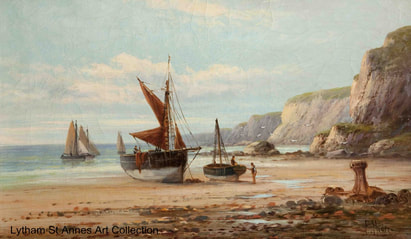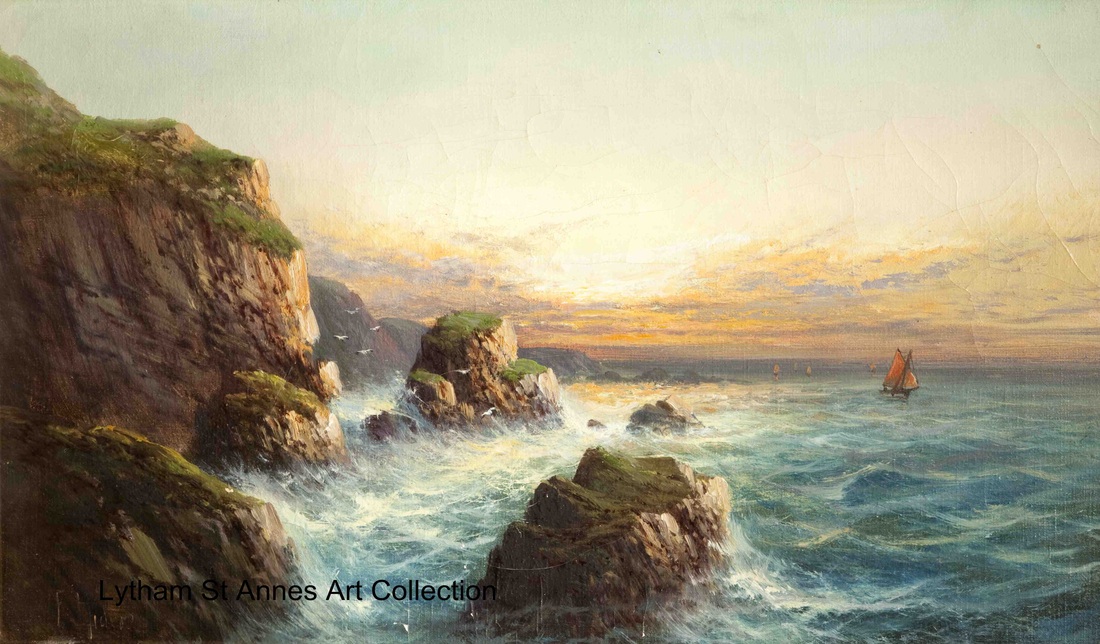Shore Scene with Boats, Cornwall & Rocky Coast Scene at Sunset, Devon
|
Research by Brenda Burkitt and Marjorie Gregson
Descriptions by Jean Holland |
|
Acc No 163 Shore Scene with Boats, Cornwall
size 29.2 x 49.5 cm (11.5 x 19.5 in) Acc No 150 Rocky Coast Scene at Sunset, Devon size 27.9 x 50.8 cm (11 x 20 in) Artist Frank Hider Artist dates 1861-1933 Medium oil on canvas Date painted unknown Inscr: Acc 150 signed Donor Charles L Snelson, 1872 -1960 formerly of 3 St Annes Road East, Lytham St Annes Date donated 20 September 1954 Donated with Acc No 162 Bridge at Llangollen (H Elliott) |
|
ARTIST
Frank Hider was born in 1861. Censuses vary as to his place of birth, citing Newington, London, Old Kent Road, London and Walworth, Middlesex. His father, George Hider, married Frank's mother, Jane Cansick (1828-1871) on 29 October 1857 in Kennington, London. He married Henrietta Maria Mackie in 1871. In the 1881 census, when living in Croydon, Surrey, the surname was spelt as Heder. Frank married Laura Anna Hill in 1885 and they had eight children, six of whom lived to adulthood. They had two sons, Frank Jr, who died in WWI, and Christopher George Hider (1896-1991), who was an art student in 1911. His daughter, Mabel Cansick Hider (1888-1958), was listed in the 1911 census as an artist working on her own account from home. As there are similar styles of landscape painting to Frank Hider on the market, signed Geo. Hider, G. Hider or M. C. Hider, they are sometimes listed as synonyms for Frank Hider but it may be the case that they are painted by his children. Frank Hider studied at Heatherleys Art School. He travelled through Britain painting rural landscapes and coastal scenes in both oils and watercolours. Hider also visited Italy and Belgium and, although a prolific painter, he rarely exhibited. He became part of the Burnham Beeches colony of painters in Buckinghamshire. His style was similar to that of S Y Johnson, although done in a broader stroke. His oils were often inscribed with the title and location on the reverse. Typical titles were Off the Cornish Coast, Bringing in the Catch and Seagulls Haunt. His work is sold regularly at Christies and other top auction houses. Paintings on public view include: The Sister Rocks Alderney Society Museum Moonlit Street Rufford Old Hall Splash Point Towner Gallery, Eastbourne Hider lived for many years in Forest Gate, West Ham, Essex and died there in 1933. Rocky Coast Scene at Sunset
The drama of this exciting seascape by Frank Hider is enhanced by the strong dynamic line running down from the cliff top on the left, past the rock with the seagulls and down into the sea, roughly in the centre of the picture. This carries the eye deep into the foamy sea smashing against the rocks. We are set further off kilter by the other strong dynamic line which takes us through the channel on the left between the rocks all the way to the distant horizon, allowing elements of the shallow picture plane to interact with those of the deep picture plane.
Although the artist uses a quite representational style, the gestural brushwork and lavish use of white is a strong pictorial force within the image, exaggerating the movement of light and the textural feel of the surface of the water as well as the rocks rising out of the sea. The cold blues and whites of the sea contrast sharply with the warm reds and browns of the rocks topped with greens and ochres, the whole scene being warmed by the gold of the distant sunset lighting up the sky and reflecting into the water which is the focal point of the painting. DONOR Charles Lewis Snelson was born in 1872 in Bolton to Charles Lewis Snelson, a master tailor, and Hannah, nee Leyland. He studied at Bolton Technical College and on the 1891 census his occupation was given as pupil teacher. By 1894 he was studying at Bangor College. Charles Snelson married Annie Longworth (1874-1961) in 1900; their daughter, Winifred, was born in 1902. On the 1911 census his occupation was given as headteacher, living in Thornton Hough, Chester. His address on the 1939 register was 26 St Martins Road, Blackpool. When Charles died in 1960 his address was 3 Fairhaven Road, Lytham St Annes. He also donated the oval, oil on canvas painting, A Bridge Near Llangollen, by H Elliot. |
REFERENCES
Wood, Jeremy, “Hidden Talents: A Dictionary of Neglected Artists Working 1880-1950” ISBN 0-9522766-0-7 www.antiques-atlas.com www.bbc.co.uk/yourpaintings www.worthpoint.com www.freebmd.co.uk www.findmypast.co.uk www.1stdibs.com |


